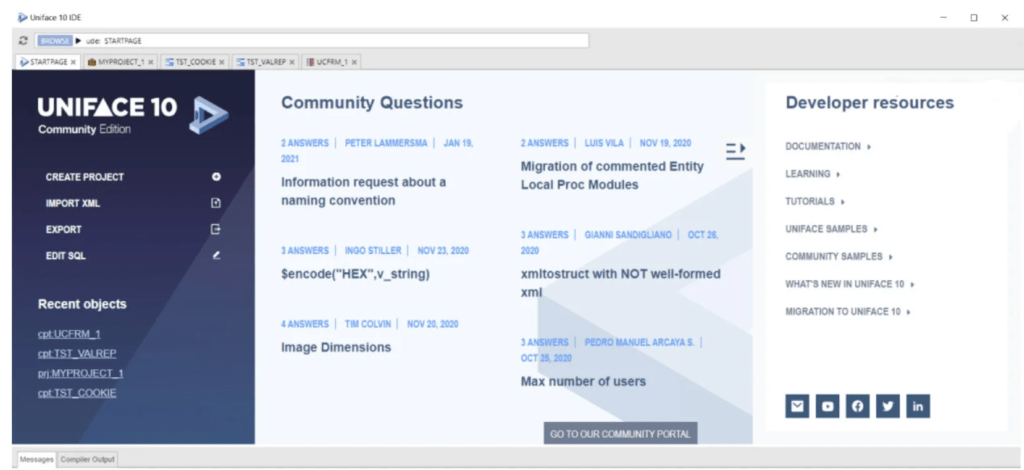Uniface
Update solution on September 1, 2023

The DSP (Dynamic Server Page) framework is what Uniface uses to build full-stack, data-centric web applications that scale. It is data-centric, with built-in data synchronisation, binding and validation. It is low code, it does a lot of the work involved in communicating between the client and the server and synchronising data – it protects its developers from race conditions, protects read-only data, protects applications from SQL injection attacks and so on.

Fig 1 – The Uniface Community Edition is an excellent way in for those new to Uniface
It also provides a rich Javascript API, for people mainly interested in JavaScript automation and who may not want to build full Uniface applications. Uniface allows developers a free hand with building their own web front ends.
Quotes
“More than anything I care about our customers’ success and the relationships we’ve built with them. Only when our customers are successful are we successful.”
Jim Byrnes, first CEO of the new Uniface in 2014
“Uniface was able to cut 60% of the 1.3 million lines of code estimated for the company’s next generation software, allowing it to install the new systems in under 3 years – compared to the 5 years quoted by Rocket’s competitors. Time savings from automating controls saved inspectors two days of work a month (10%) on average.”
A global French food distribution company
Traditional Uniface-based desktop applications have been successful with Uniface’s loyal customers for many years but are now facing increased competition, from, for example: modern web UIs, the trend towards increased remote and home working with BYOD (Bring Your Own Device; perhaps this is better thought of as Bring Your Own Interface); and, of course, the move to cloud deployment at scale.

Fig 2 – Uniface has been a trusted platform for about four decades
Uniface has been making an effort to ensure that its customers can enhance their applications with these latest approaches, without being disadvantaged with respect to their competitors, for a long while now. Its latest technology modernisations will make its customers’ new technology journeys even easier and once Rocket and Uniface have addressed customer retention, post-merger, these new Uniface features should help to attract new customers.
Local functions are available with component-level scope (callable from anywhere in the component); Entity/Occurrence-level scope (restricted to the Entity/Occurrence triggers as well as their direct fields); and Field-level scope (restricted to the field’s triggers).
Support for new widget functionality including an open API for integrating/creating complex custom widgets); and a Web component widget set which will be implemented using these; thus helping Uniface to deliver a consistent and accessible UX/UI.
Uniface now supports automatic layout generation and comes with a new reference web application, Docker support and an improved Cloud License Manager. Extending Uniface with central logging, auto scale and monitoring enable simple deployment into an Orchestrated environment.
A key issue is that you can’t simply translate a desktop application into a full-function enterprise web application. This is because a multi-user business application needs to be built on a firm foundation that makes it resistant to attacks from malicious parties (or even unintended user error). As Uniface says “Significant business risks would be introduced if an automated process were to convert a desktop application directly into an enterprise-scale web application”. Once the foundations are secure, business logic can be layered on top.
Uniface is particularly proud of its eLearning support, which is inspiring similar capabilities across Rocket. New eLearning modules will, of course, be created enabling the developers to understand and adopt the new functionality.
To summarise, Uniface has identified several enhancements to the current DSP approach, the Uniface scripting language and the development environment, that it thinks will simplify development, increase application quality, and minimise the knowledge of HTML, CSS and JavaScript needed to create a rich user experience.
These will increase a developer’s focus on the business logic generally, through simplifying application development and increasing productivity. They simplify and automate exception- and error-handling and ensure the Uniface system is left in a good known state, whether application exceptions are handled specifically or not.
The Bottom Line
The Uniface acquisition by Rocket seems very positive, and both companies have a similar customer focus. Uniface itself has been modernised, and this will help its customers modernise their own Uniface installations and then, perhaps, add new functions to other legacy applications.
Related Company
Connect with Us
Ready to Get Started
Learn how Bloor Research can support your organization’s journey toward a smarter, more secure future."
Connect with us Join Our Community
